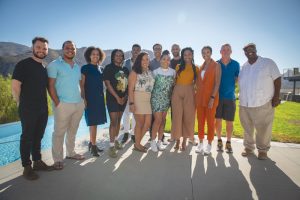A Key Aspect of Changing the DEI Landscape in the AEC Professions
As our industry looks for ways to change its landscape of diversity, equity, and inclusion (DEI), many are primarily focused on the upstream end of “the pipeline” and who enters it. While efforts to recruit from and build AEC awareness within our underrepresented communities are of critical importance, we cannot lose sight of the diverse and talented people working alongside us every day. Action is required to ensure they are supported, sponsored, and included in an authentic, meaningful way.

Many in our profession look to leaders who do not look like them, leaders whose combined identities, backgrounds, and life experiences do not mirror their own. From the opposite direction, many of our leaders look at their teams and recognize only the valuable qualities they have seen before, overlooking the myriad of leadership traits that have yet to be recognized in our industry. Our profession will not be truly representative and inclusive until many of these talented people become influential decision-makers and join the ranks of leadership. We should focus on supporting talent while also re-evaluating how we define leadership in order to shift the dynamic of who fills these roles.
KPFF offers two specific ideas to share with our industry partners:
KPFF has created an Inclusive Culture Training Program which encourages vulnerability, open conversation, and education. The program promotes an inclusive culture that is attractive to the talent we seek and the existing workforce, and generates impact and change in our organization. A post-program survey indicates that 95% of participants have found the content valuable.
We also recently participated in the creation of a new Leadership Development Program in collaboration with the Southern California Chapter of the National Organization for Minority Architects (NOMA). Our initial cohort of twelve influential professionals from architecture, engineering, and construction have built their skillset, forged important friendships, and made meaningful connections with leaders in our local industry. We hope this is the beginning of a sustained effort to helping diverse talent thrive in our industry and ignite this type of program nationally.
When thinking about our entire industry, it is critical that we share our new insights and improve our practices rather than forge these improvements as a competitive advantage against each other. This is especially crucial as DE&I is about making holistic change for an improved future for the profession. Our partners in the construction industry are viewing progress in this arena as akin to progress in construction safety; this is truly a place where a rising tide will lift all boats. We urge others to share their best ideas and practices so, together, we can create a diverse, equitable, and inclusive profession that thrives.
We encourage all firms to support industry organizations in their DEI efforts. Keep the conversation at the forefront and contact STRUCTURE magazine to share your perspectives and successes.■
